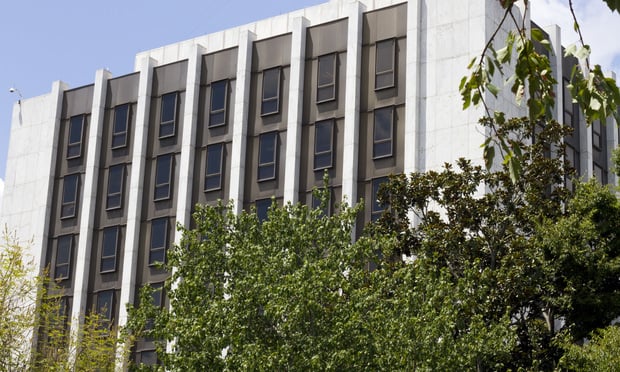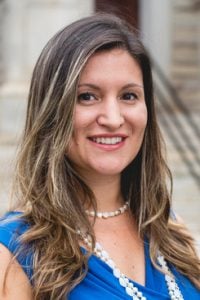New Program Using 'Virtual Internships' to Pair Georgia Law Students With Judges
The program from the Georgia Latino Law Foundation will have students meet via Zoom with judges or their staff attorneys twice a week, and ask all students to work on a project on emerging issues from COVID-19.
May 06, 2020 at 12:30 AM
5 minute read
The original version of this story was published on Daily Report
 DeKalb County Courthouse, Decatur, Georgia. (Photo: John Disney/ ALM)
DeKalb County Courthouse, Decatur, Georgia. (Photo: John Disney/ ALM)
The head of the Georgia Latino Law Foundation, Ana Maria Martinez, is spearheading a virtual judicial internship program for second-year law students who've had their summer associate plans canceled at law firms.
The virtual internships with Georgia judges are open to all 2Ls at the state's ABA-accredited law schools, Martinez said. The deadline to apply is May 15.
The five-week summer program is unpaid but offers aspiring lawyers experience working in a judicial office. "It gives law students opportunities to have a substantive summer and feel like their hard work wasn't wasted this year," said Martinez, who serves as a staff attorney for DeKalb County State Court Judge Dax Lopez. "It's a way to expose them to new connections, how the court system works and perhaps a new mentor."
Martinez said she got the idea from reading stories about canceled law firm summer programs in the Daily Report. "It started gnawing at my brain, and I woke up thinking, 'What can we [in the court system] do?'"
Martinez graduated from Georgia State University College of Law in 2009, another tough and uncertain time for law students in the midst of the recession from the financial crisis. "I remember how easy it was to feel defeated," she said. "I was very blessed in my career search, but I had many classmates who felt hopeless and helpless. I wanted to make sure these students do not feel abandoned."
Martinez said the organizers are asking law students to commit to a minimum of 20 hours per week. "It's going to be very flexible so the judges can use the interns in the best way for their chambers," she said, adding that the students will meet via Zoom with judges or their staff attorneys twice a week.
One unique feature of the program is that it asks all students to work on a project—either a memo or research guide—on emerging issues from COVID-19 that will likely be coming before the courts. Martinez hopes by the end of summer to have a database of all the law students' research available to the state's judiciary.
The organizers are soliciting attorney mentors to advise students on the research project, and they are putting together a curriculum of assignments that judges can use if they haven't hosted an intern before.
An orientation to prepare students to be successful in a virtual internship will be held the first week in June, and the interns will start June 8 for the five-week program.
 Ana Maria Martinez, president of the Georgia Latino Law Foundation. (Courtesy photo)
Ana Maria Martinez, president of the Georgia Latino Law Foundation. (Courtesy photo)Martinez has formed a committee to recruit judges and law students. The committee includes five Georgia judges: Court of Appeals Presiding Judge Sara Doyle and Elizabeth Gobeil; Fulton County State Court Judge Susan Edlein; DeKalb County State Court Judge Kimberly Anderson; and Toombs County Chief Magistrate Judge Rizza O'Connor.
Michael Eshman, trial lawyer at Eshman Begnaud and GLLF board member, and Alexis Martinez, Georgia State University College of Law's associate dean of students, are also on the committee, along with GSU Law graduate Lina Machado and Emory Law student Sarah Banda.
The virtual internship program has 13 participating judges so far, mostly in metro Atlanta, Martinez said, from magistrate, state, superior, appellate and federal courts. She said her committee is also contacting bankruptcy and workers' compensation judges. "I feel there is going to be an explosion of COVID-related cases in all those courts," she said.
The aim is to have between 20 and 25 judges participating, she said. Those interested should email [email protected].
Interested students may apply through a posting in their law school career services office. The application asks for a resume and a statement of interest on why the student wants to participate and how the coronavirus pandemic has affected their summer plans.
Students can't ask for a specific judge, but Martinez encouraged applicants to let the organizers know in their statement of interest what type of law interests them. That way, a student interested in criminal law, for instance, could be paired with a magistrate judge for "the nitty-gritty of criminal law,"' she said.
This content has been archived. It is available through our partners, LexisNexis® and Bloomberg Law.
To view this content, please continue to their sites.
Not a Lexis Subscriber?
Subscribe Now
Not a Bloomberg Law Subscriber?
Subscribe Now
NOT FOR REPRINT
© 2025 ALM Global, LLC, All Rights Reserved. Request academic re-use from www.copyright.com. All other uses, submit a request to [email protected]. For more information visit Asset & Logo Licensing.
You Might Like
View AllTrending Stories
- 1Buyer Beware: Continuity of Coverage in Legal Malpractice Insurance
- 2‘Listen, Listen, Listen’: Some Practice Tips From Judges in the Oakland Federal Courthouse
- 3BCLP Joins Saudi Legal Market with Plans to Open Two Offices
- 4White & Case Crosses $4M in PEP, $3B in Revenue in 'Breakthrough Year'
- 5Thursday Newspaper
Who Got The Work
J. Brugh Lower of Gibbons has entered an appearance for industrial equipment supplier Devco Corporation in a pending trademark infringement lawsuit. The suit, accusing the defendant of selling knock-off Graco products, was filed Dec. 18 in New Jersey District Court by Rivkin Radler on behalf of Graco Inc. and Graco Minnesota. The case, assigned to U.S. District Judge Zahid N. Quraishi, is 3:24-cv-11294, Graco Inc. et al v. Devco Corporation.
Who Got The Work
Rebecca Maller-Stein and Kent A. Yalowitz of Arnold & Porter Kaye Scholer have entered their appearances for Hanaco Venture Capital and its executives, Lior Prosor and David Frankel, in a pending securities lawsuit. The action, filed on Dec. 24 in New York Southern District Court by Zell, Aron & Co. on behalf of Goldeneye Advisors, accuses the defendants of negligently and fraudulently managing the plaintiff's $1 million investment. The case, assigned to U.S. District Judge Vernon S. Broderick, is 1:24-cv-09918, Goldeneye Advisors, LLC v. Hanaco Venture Capital, Ltd. et al.
Who Got The Work
Attorneys from A&O Shearman has stepped in as defense counsel for Toronto-Dominion Bank and other defendants in a pending securities class action. The suit, filed Dec. 11 in New York Southern District Court by Bleichmar Fonti & Auld, accuses the defendants of concealing the bank's 'pervasive' deficiencies in regards to its compliance with the Bank Secrecy Act and the quality of its anti-money laundering controls. The case, assigned to U.S. District Judge Arun Subramanian, is 1:24-cv-09445, Gonzalez v. The Toronto-Dominion Bank et al.
Who Got The Work
Crown Castle International, a Pennsylvania company providing shared communications infrastructure, has turned to Luke D. Wolf of Gordon Rees Scully Mansukhani to fend off a pending breach-of-contract lawsuit. The court action, filed Nov. 25 in Michigan Eastern District Court by Hooper Hathaway PC on behalf of The Town Residences LLC, accuses Crown Castle of failing to transfer approximately $30,000 in utility payments from T-Mobile in breach of a roof-top lease and assignment agreement. The case, assigned to U.S. District Judge Susan K. Declercq, is 2:24-cv-13131, The Town Residences LLC v. T-Mobile US, Inc. et al.
Who Got The Work
Wilfred P. Coronato and Daniel M. Schwartz of McCarter & English have stepped in as defense counsel to Electrolux Home Products Inc. in a pending product liability lawsuit. The court action, filed Nov. 26 in New York Eastern District Court by Poulos Lopiccolo PC and Nagel Rice LLP on behalf of David Stern, alleges that the defendant's refrigerators’ drawers and shelving repeatedly break and fall apart within months after purchase. The case, assigned to U.S. District Judge Joan M. Azrack, is 2:24-cv-08204, Stern v. Electrolux Home Products, Inc.
Featured Firms
Law Offices of Gary Martin Hays & Associates, P.C.
(470) 294-1674
Law Offices of Mark E. Salomone
(857) 444-6468
Smith & Hassler
(713) 739-1250






